Gianluca Vialli: How the ex-Italy striker is helping boost Stevenage's promotion hopes
- Published
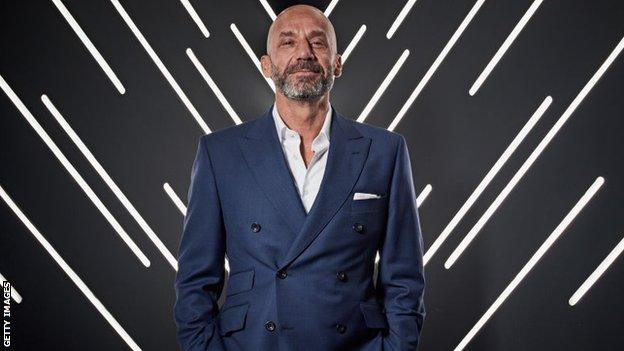
Gianluca Vialli first moved to English football with Chelsea from Juventus in 1996
What do Gianluca Vialli and a nursery in a Hertfordshire town have in common?
Both are helping fund a League Two club's promotion aspirations.
Stevenage owner Phil Wallace takes pride in "doing things differently" - and having a world-renowned, Champions League-winning former Italy striker oversee the part sale of a club that has a creche on site is certainly that.
"This is what we do," Wallace told BBC Sport. "We have added income streams everywhere we can.
"I don't think many clubs have nurseries. We've had it a couple of years and it has a six-month waiting list with over 80 or 90 kids.
"We do everything we can to maximise income so we can spend it on footballers and climb up the pyramid."
Child's play, however, can only get you so far.
So in an effort to boost Stevenage's playing budget, Wallace has put a 12% stake of the club up for sale and entrusted Tifosy, a sports investment company co-founded by ex-Juventus and Chelsea striker Vialli and former investment banker Fausto Zanetton, to oversee it.
As a player, Vialli earned affection from the terraces for scoring goals. These days his work in football is helping clubs build those stands.
Stevenage themselves have previously raised £600,000 through a bond scheme to redevelop part of their ground.
"I'm lucky because my life has been very exciting," said Vialli. "As a player I had the opportunity twice a week to play football in front of thousands of people and I could make them happy by just scoring a goal.
"At my age now, my excitement comes from the possibility of investing in clubs like this."
And so he now owns a small stake in Stevenage. It is the 55-year-old "putting your money where your mouth is".
Sex, cars and giving something back
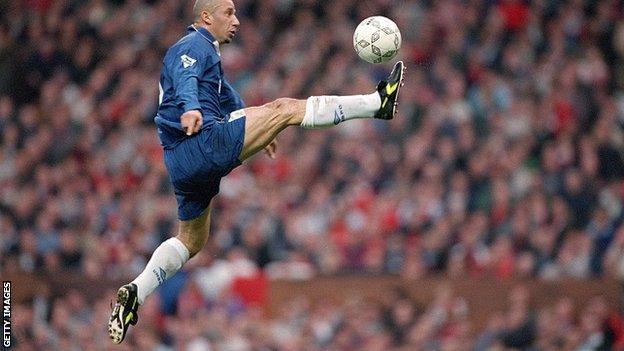
Gianluca Vialli was player-manager at Chelsea and had a stint in charge of Watford before moving into TV punditry
Likewise, he was among the investors that saw Norwich City raise £5m to build a new academy and has previously put money into Portsmouth and Italian clubs Frosinone and Pescara.
"If you want to sell a service, you have to be the first to believe that the service has value," he said.
The value Vialli sees is not just the returns on his investments or the financial success of the business - although both he says are good for his bank account - but what it could mean for a sport he first became infatuated with as a three-year-old.
"I'm incredibly grateful to football," said the Italian, who won the FA Cup, League Cup and Uefa Cup Winners' Cup as Chelsea manager.
"It's because of football that I bought my first car, I bought my first house and I probably had sex for the first time… actually, that was definitely because of football.
"I made my parents proud because of football and I was able to feel so much and give so much to the fans who supported the clubs I played for, so I'm now at an age that you have to be grateful and try to give something back.
"I'm not doing this for free because we hope the business goes well, but ultimately it's about something that has not been done before - this is a new service and new opportunity for fans to help clubs be more sustainable, create a better future and improve performances."
Having supporters pour money into football, however, is nothing new, as filing through turnstiles, buying merchandise and TV subscriptions are already relied upon to fill club coffers.
"We would like football fans to one day not be considered just as clients, but as partners," said Vialli.
'More money, more chances of success'
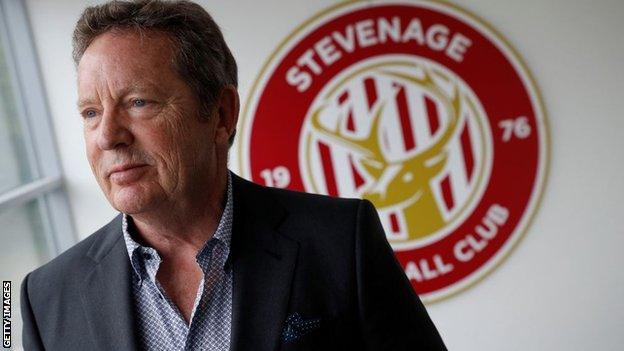
Phil Wallace got involved in Stevenage 20 years ago when the club faced administration
Turning to Vialli at Tifosy was not Wallace's first choice when looking for investors.
Efforts to bring a partner on board as a minor shareholder ended with takeover offers.
"But I'm not willing to sell just yet," said Wallace. "This is my hobby, I don't do this for any other reason. I'm not developing land, I don't have any ulterior motives and I'm not doing it to make money.
"This is fun. We are building a new stand and it's always been my desire to finish the stadium.
"When this came up with Tifosy, something new that has never been done before, I could see it fit our model so we went for it."
The aim is to raise £1.2m - shares are priced at £25 each, with a minimum subscription of 40 shares at a total of £1,000 - all of which is to be spent over two seasons on player salaries and transfers.
"There is a real challenge in coming up with innovative ideas that people can share in and that also widen the interest in the club," said Wallace.
"And yes, it provides funds for the club, but it is just a unique way to engage with people to widen ownership.
"None of the money goes to shareholders, all of it goes on players, so logically it should enhance our chances of success."
'Not ridiculous territory'
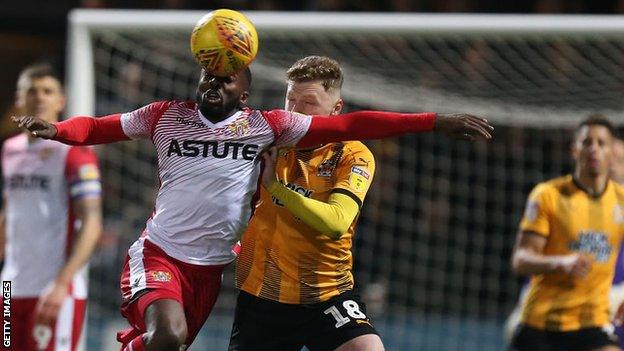
Stevenage finished 10th in the League Two table in 2018-19
So the side that missed out on a play-off place by a solitary point last season could boost their spending power by more than £700,000 in the coming season, with Wallace revealing that 40% of money raised would be reserved for the following campaign.
In League Two terms, that is taking a budget of about £1.6m and making them among the fourth division's high rollers.
"You can see what a million pounds will do for an average budget," explained Wallace, who also said profits of more than £700,000 made in the 2017-18 season will be reinvested in the club.
"It gives you a really good chance, but of course doesn't guarantee promotion."
And if promotion from League Two is achieved, with it comes a 25% dividend on investments. Getting to the Championship would then see investors get a further 75% while retaining their shares.
Shareholders, of which around 700 registered an interest, also get voting rights - albeit proportionate, as Wallace will maintain as much as 86% of the club - and will be consulted on things such as kit design and stadium plans.
Shares will also be made tradable on a market operated by Tifosy.
"We have been in the League One play-offs before (2012), so this is not ridiculous territory for us to think we can get to the Championship," said Wallace.
"The club will be more valuable the higher it goes in the leagues. If you are then also getting a dividend each time we progress with promotion and if you are able to trade on exchange with willing buyers and willing sellers, it all could look very interesting."
'It's not a donation'
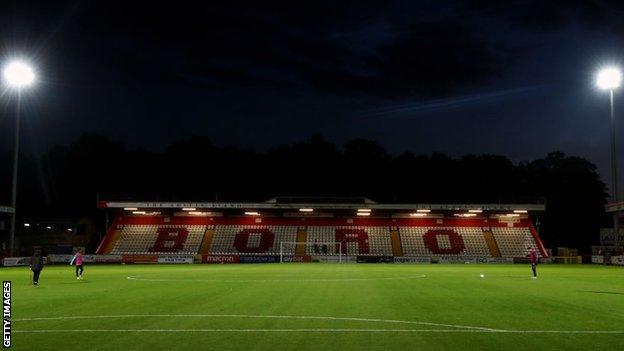
Stevenage's Lamex Stadium home is being refurbished with a new stand after raising £600,000 through Tifosy
Zanetton, who worked in banking at Morgan Stanley and Goldman Sachs before teaming up with Vialli, said the share offering at Stevenage has attracted diverse interest - ranging from lifelong fans to potential international backers.
"There is no one reason people believe these are good investment opportunities," he said.
"At the lower end, people may invest more because it is in support for their club, while the higher-ticket investor looks at it more as an interesting investment opportunity.
"It is not a donation. This is not giving money for free, as people expect a return.
"It is a much more equitable relationship. For clubs, they shouldn't see this as asking fans for money, they are offering them an investment opportunity and for fans putting in money they should do that with the view of it being a real investment."
And investing in clubs is something that Vialli, Zanetton and those at Tifosy have made their business.
Teaming up with Premier League clubs on projects worth tens of millions "is happening", says Vialli, who is also keen to see the company make an impact in other sports.
"One day this will be the norm," he said. "It's another way to raise money to make clubs more sustainable.
"We offer a service that everybody basically needs. It is import to us that we can help clubs reconnect to fans and recreate relationships that used to be there and are now not there anymore."